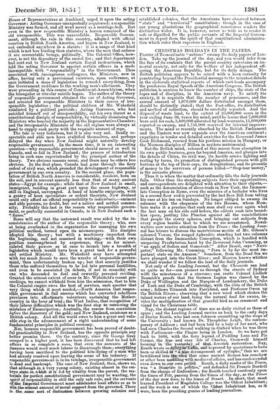CHRISTMAS HOLIDAYS IN THE PAPERS.
FLOODS of Transatlantic " notions" swamp the daily papers of Lon- don. Take up the journal of the day, and you would infer from the face of its contents that the parent country entertains an im- mortal anxiety, not only for the welfare of her independent off- spring the American Republic, but for its daily doings. The British politician appears to be seized with a keen curiosity for . penetrating beyond the Presidential message to the minutest details in the elaborate statistical reports of which cart-loads accompany the ponderous Royal Speech of the American Congress. The British politician is anxious to know the number of ships, the state of the ropes and of discipline, in the American navy. To satisfy his anxiety, it is requisite that the number of pensioners, and the annual amount of 1,070,000 dollars distributed amongst them, should be distinctly stated; that the Post-office, its distribution and method of collection, should be carefully reported. And the disposal of waste land, to the extent of 23,000,000 acres in the year ending June 30, vexes his mind, until he learns that 7,000,000 were sold for cash, 3,400,000 allocated by land-warrants, 11,000,000 reported as swamp, and 1,751,000 reserved for internal improve- ments. The mind so recently absorbed by the British Parliament and the Eastern war now expands over the American continent ; expatiates in tender and detailed anxieties for the Reverend James Cook Richmond, rescued from his perilous mission inauegary, or the Mormon rlieciples of Milton in matters matrimonial. But the British mind, released at this season from absorption in its own public business, goes far beyond America, and plunges into the details of China, its civil war, its hostile armies Aghting and resting by turns, its promotion of distinguished persons with gilt buttons at the top of their caps, its decapitations, and its presents of money to the survivors of persons killed—" Stop-tear money," is the sarcastic phrase.
Thus it is when the matter that ordinarily fills the daily journals
fails. Other than the standing subjects liave their opportunities; and correspondents are delighted with attention to their objects,— such as the denunciation of slave-trade in New York, the Immacu- late Conception in Rome, even the miseries of a bachelor who lives in a second-floor midis prevented by the last Beer Bill from taking his ease at his inn on Sundays. No longer obliged to swamp its columns with the eloquence of the two Houses, whose Mem- bers make it a practice that each man shall say over again what the last man on his side said before, the editors rush into bound- less space, jostling like Phaeton against all the constellations that people the starry spheres, and bringing out subjects from every region besides that to which we are accustomed. Novel- writers now receive attention from the Times ; the Leading Jour- nal has leisure to discuss the meretricious merits of Mr. Gibson's coloured "Venus. the rouged Aphrodite standing but two columns distant from the Immaculate Conception, which is handled with unsparing Presbyterian hand by the Reverend John Cumming, as "an apple of Sodom and Gomorrah!" After Brazil, says "Navi- gator," following Mr. Cumming, "Peru is by far the most im- portant state on the Amazon." Somehow' from the Dead Sea we have plunged into the Great,River ; and Heaven knows whither we shall wander if we follow the lead of the daily journals.
Not only of the Leading Journal, but the Chronicle can lead us quite as far—can pioneer us through the streets of Sydney with the minuteness of a cicerone; can recite Colonel Ludlow Beamish's proofs that the German Legion was classed by the Duke of Wellington and the Marquis of Londonderry, the Duke of York and the Duke of Cambridge, with the elite of the British army ; follows Titmarsh into Fairyland, and Professor Owen up the British Rivers ; observing that a new weed which chokes the inland waters of our land, being the natural food for swans, in- vites the multiplication of that graceful bird as an ornament and. viand for the Christmas table.
Nay, the distant regions of time are as daily visited as those of
space; and the Leading Journal carries us back to the early days of Doctor Routh, who had seen Johnson scrambling up the steps of the University ; had known Dr. Theophilus Leigh, the contem- porary of Addison ; and had been told by a lady of her aunt, who had seen Charles the Second walking inlOsferd when he was there with Parliament—the Plague being in London. So we have got back to 1666, with the fiery legend-of Pudding Lane and Pie Corner, .the kw and easy life of Charles Cromwell himself looming 'in. ;the, yest y erda of that. feverish restoration. Nay, Routh 'wrote s,o.dnftititt'llien, and is proved by quotations to have been so iikilled•Big a Dille derangement of epitaphs," that we are bewildered into the'-ides that some ancient Roman has somehow or other been meddling with medireval affairs, and has condescended even down to-our own period. Routh, a daily reader of the 2'ime8, was "a &aerate in politics," and defended Sir Francis Burdett from the charge of Radicalism ;,,for,Routh. touched carelessly upon. the times of Pitt, pessing from the-iirhes of rthe day, as the Times of the day now does, to the times of Stuart. In short, thatmoat learned President of Magdalen College was the Oldest Inhabitant; and the week is one of which the Oldest Inhabitant has, as it were, been the presiding genius of leading journalism.


























 Previous page
Previous page